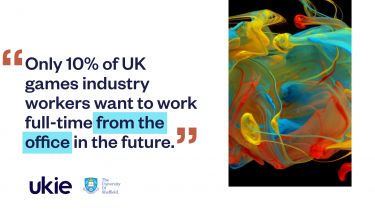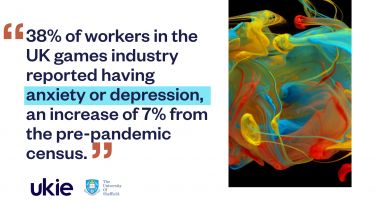- University of Sheffield researcher has compiled the second ever census of the UK’s video game industry giving a new insight into its demographic make up and working habits
- Census reveals an increase in the number of workers struggling with their mental health, with 38 per cent of respondents reporting that they suffered from anxiety, depression or both - up from 31 per cent before the pandemic
- Results reveal that only 10 per cent of workers want to return to working from the office full-time now Covid-19 restrictions have eased, more than half prefer a hybrid approach and 38 per cent wish to work from home full time - suggesting a shift in the way the industry will work in the coming years
- Census data shows marginal improvements to diversity in the UK’s game industry compared to 2020, with a slight increase in the number of women and representation of different sexualities, however the number of Black, Asian and Minority Ethnic people working in the industry remains the same
The University of Sheffield has compiled the second ever UK Games Industry Census, giving a deeper insight into the demographic make-up and working habits of the UK video games industry.
The census was completed by over 3600 industry workers in autumn 2021, and asked respondents about their personal characteristics and background – such as ethnicity, gender identity and sexuality – as well as about their working practices. It has been published by Ukie and conducted by Dr Mark Taylor, from the Sheffield Methods Institute at the University.
The census was first conducted in 2019 prior to the pandemic. The first-of-its-kind report delivered the most comprehensive and detailed assessment of diversity within the UK games industry workforce ever conducted. This time around, it also explored a number of new areas such as the impact of the pandemic on working practices and attitudes towards the workplace and industry to deepen understanding of the sector.
Attitudes to the workplace
The pandemic has resulted in both major changes to how people in the UK games industry work and their preferences for where they’ll work in the future.
Pre-pandemic, 66 per cent of people in the industry reported that they worked in the office, compared to 9 per cent at home and 7 per cent working in a hybrid system. By Autumn 2021, 80 per cent were working at home, 8 per cent from the office alone and 11 per cent in a mix of both.
Looking ahead, only 10 per cent of industry workers expressed a preference to work from the office in the future. In comparison, 52 per cent of respondents identified their ideal working situation to be a hybrid approach and 38 per cent wanted to work from home full time, suggesting a shift in the way the industry will work in the future.
Overall, attitudes to both individual workplaces and the industry at large tend to be positive. The vast majority of people who work in the sector feel proud to do so, with 87 per cent of people being proud to tell others where they work specifically and 85 per cent proud to be a part of the UK games industry.
But people tend to speak more positively about their company than the industry as a whole. For example, whilst 83 per cent of respondents recommended their own workplace as a great place to work, only 66 per cent said the same about the games industry as a whole.
The demographic profile of the UK games industry
The demographic make-up of workers in the games industry showed marginal improvements to diversity in the 2022 census when compared to 2020.
The gender make-up of the industry diversified slightly. According to this year’s census, 67 per cent of the workforce is male, 30 per cent is female and 3 per cent is non-binary compared to 70, 28 and 2 per cent in 2020 respectively.
The representation of different sexualities increased from the 2020 census. The number of people who reported a sexuality other than heterosexual was up to 24 per cent from 21 per cent – significantly higher than in the wider adult population.
The games industry workforce remained young with 61 per cent listing their age as 35 or under in 2022, although this was a slight reduction compared to 66 per cent two years earlier.
The figures for ethnic groups remained similar to those reported two years ago, with 66 per cent of the workforce reporting that they are White British, 24 per cent as White Other, 5 per cent as Black, 2 per cent as Asian, 2 per cent as Mixed/Multiple ethnicity and a further 2 per cent as other.
Mental health and neurodiversity in the games industry
Looking into mental health conditions, 38 per cent of the people who responded to the census reported that they suffered from anxiety, depression or both. This is up from 31 per cent before the pandemic.
The games industry has more neurodivergent people working within it than the working age population. Overall, 18 per cent of respondents reported having at least one neurodevelopmental condition. More people in games were autistic or had a condition affecting concentration, such as ADHD, than the working age population.
Dr Mark Taylor, who compiled the census from the Sheffield Methods Institute at the University of Sheffield, said: “The UK games industry has expanded significantly in the last few years, so it’s really important to pay attention to what’s happening in the workforce: both who’s working in games, and how they’re doing.
“It’s encouraging that people’s attitudes towards their workplaces are so positive - far outstripping attitudes in other sectors I’ve looked at - but it’s important to keep an eye on people’s attitudes to the sector more broadly.”
Dr Jo Twist OBE, CEO of Ukie, said: “The result of this year’s games industry census shows that the industry has made progress on building an equal, diverse and inclusive sector, adapting well to the immediate challenges posed by the pandemic, but that plenty of work still lies ahead.
“We must ensure that initiatives like #RaiseTheGame, which has signed up 205 partners since 2020, continue to play a key role in driving forward meaningful long-term change to ensure we do not miss out from the opportunities of being a truly inclusive sector.”
You can read the full UK Games Industry Census report for 2022 here.
Contact
For further information please contact:





